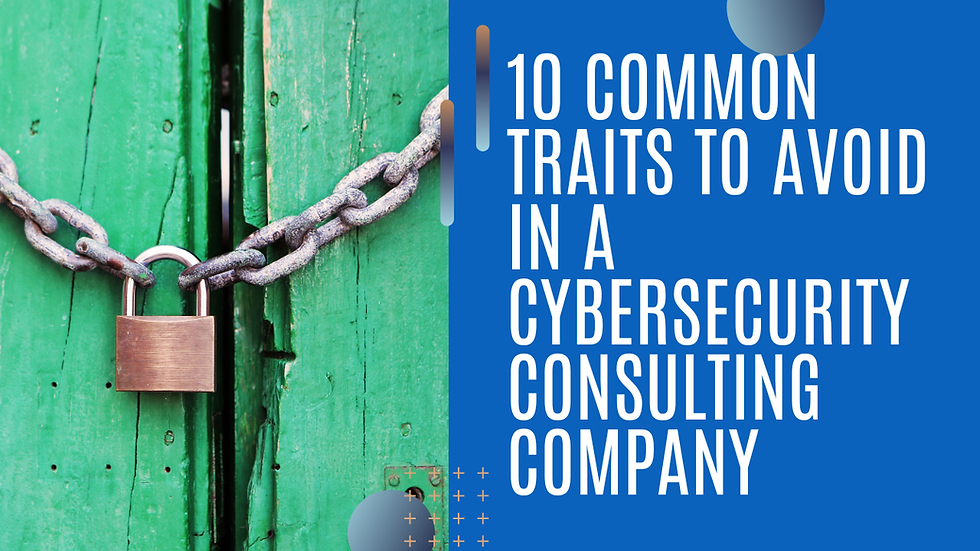18 Cybersecurity Consulting Company Traits to Avoid
- David Sockol
- Feb 1, 2024
- 2 min read
Understanding the positive traits to seek in a cybersecurity partner is highly valuable. Equally important is recognizing the traits that should raise concerns. This list outlines indicators within the 18 crucial factors that suggest potential issues in the future if you decide to engage these companies as your security partners.

1. Expertise and Experience:
Newly set up companies, lack of experience, or a limited track record in addressing diverse cybersecurity challenges within specific industries can undermine the effectiveness of cybersecurity solutions.
2. Industry-Specific Knowledge:
Consulting companies failing to stay updated on industry-specific threats and compliance requirements may result in outdated strategies that do not adequately address current risks.
3. Client References and Reputation:
Cheap companies (fakes & frauds) with negative online reviews or a lack of client references can cast doubt on the firm's ability to deliver effective cybersecurity solutions.
4. Comprehensive Services Portfolio:
An incomplete or narrow portfolio may leave clients exposed to unaddressed cybersecurity threats, requiring them to seek additional services from multiple providers.
5. Collaborative Approach:
Insufficient emphasis on collaboration may lead to misalignment between the consulting firm and the client, resulting in ineffective cybersecurity strategies.
6. Transparency and Communication:
Poor communication or a lack of transparency regarding processes and pricing can erode trust and hinder effective decision-making.
7. Incident Response Capabilities:
Delayed or inadequate incident response, particularly at Level 1, may result in prolonged exposure to cybersecurity threats and increased impact on the organization.
8. Access to Monitoring Tools:
Limited access to monitoring tools or insufficient training on tool usage may hinder clients from actively participating in their cybersecurity monitoring.
9. Ownership of Logs and Data:
Ambiguity or lack of clarity regarding data ownership may lead to disputes and concerns over the security and privacy of sensitive information.
10. Customization and Flexibility:
A rigid approach that lacks customization may result in solutions that do not align with the unique needs and evolving requirements of the client.
11. Service Level Agreements (SLAs):
Vague or unrealistic SLAs may create expectations that cannot be met, leading to dissatisfaction and a lack of accountability.
12. Threat Intelligence Database:
Neglecting regular updates to the threat intelligence database may render the cybersecurity measures ineffective against emerging threats.
13. Data Security and Compliance:
Non-compliance with data protection regulations or insufficient security measures may result in legal consequences and reputational damage.
14. Employee Expertise:
Inadequate training or a lack of qualified personnel or ~100% outsourced services may compromise the firm's ability to deliver high-quality cybersecurity solutions.
15. Cost Structure:
Unclear or hidden costs in the pricing structure may lead to budget overruns and strained client relationships.
16. Commercial Tools and Support:
Dependence on unreliable or unsupported commercial tools may result in service interruptions and compromised cybersecurity infrastructure.
17. Ownership of Tools:
Lack of client ownership over cybersecurity tools (designed to hold clients hostage) may limit customization and create dependencies on the consulting firm.
18. Deployment Model:
Choosing an incompatible deployment model that does not align with the client's preferences and security requirements may hinder seamless integration and effectiveness.
Emagined, like any cybersecurity consulting firm, is committed to avoiding these pitfalls, ensuring a proactive and effective approach to cybersecurity that addresses the unique needs and challenges of each client.
.png)

